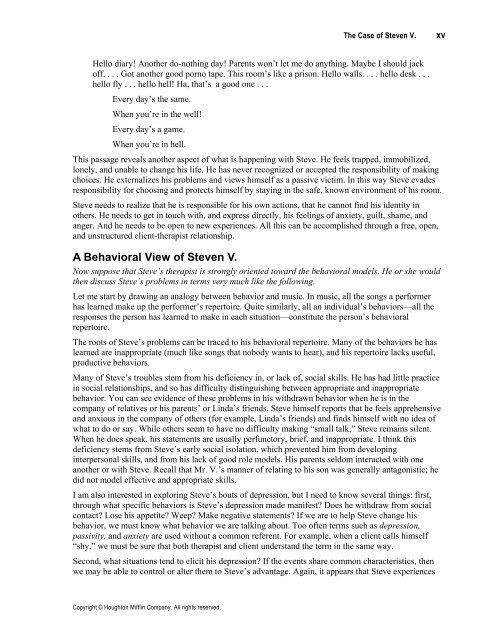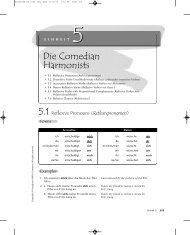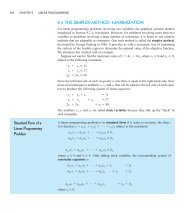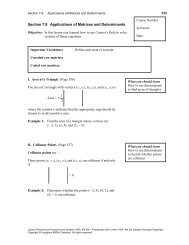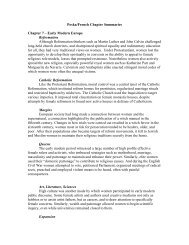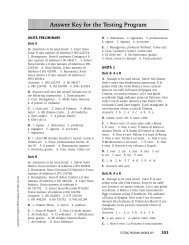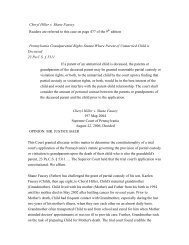Understanding Abnormal Behavior - Cengage Learning
Understanding Abnormal Behavior - Cengage Learning
Understanding Abnormal Behavior - Cengage Learning
You also want an ePaper? Increase the reach of your titles
YUMPU automatically turns print PDFs into web optimized ePapers that Google loves.
Copyright © Houghton Mifflin Company. All rights reserved.<br />
The Case of Steven V. xv<br />
Hello diary! Another do-nothing day! Parents won’t let me do anything. Maybe I should jack<br />
off. . . . Got another good porno tape. This room’s like a prison. Hello walls. . . . hello desk . . .<br />
hello fly . . . hello hell! Ha, that’s a good one . . .<br />
Every day’s the same.<br />
When you’re in the well!<br />
Every day’s a game.<br />
When you’re in hell.<br />
This passage reveals another aspect of what is happening with Steve. He feels trapped, immobilized,<br />
lonely, and unable to change his life. He has never recognized or accepted the responsibility of making<br />
choices. He externalizes his problems and views himself as a passive victim. In this way Steve evades<br />
responsibility for choosing and protects himself by staying in the safe, known environment of his room.<br />
Steve needs to realize that he is responsible for his own actions, that he cannot find his identity in<br />
others. He needs to get in touch with, and express directly, his feelings of anxiety, guilt, shame, and<br />
anger. And he needs to be open to new experiences. All this can be accomplished through a free, open,<br />
and unstructured client-therapist relationship.<br />
A <strong>Behavior</strong>al View of Steven V.<br />
Now suppose that Steve’s therapist is strongly oriented toward the behavioral models. He or she would<br />
then discuss Steve’s problems in terms very much like the following.<br />
Let me start by drawing an analogy between behavior and music. In music, all the songs a performer<br />
has learned make up the performer’s repertoire. Quite similarly, all an individual’s behaviors—all the<br />
responses the person has learned to make in each situation—constitute the person’s behavioral<br />
repertoire.<br />
The roots of Steve’s problems can be traced to his behavioral repertoire. Many of the behaviors he has<br />
learned are inappropriate (much like songs that nobody wants to hear), and his repertoire lacks useful,<br />
productive behaviors.<br />
Many of Steve’s troubles stem from his deficiency in, or lack of, social skills. He has had little practice<br />
in social relationships, and so has difficulty distinguishing between appropriate and inappropriate<br />
behavior. You can see evidence of these problems in his withdrawn behavior when he is in the<br />
company of relatives or his parents’ or Linda’s friends. Steve himself reports that he feels apprehensive<br />
and anxious in the company of others (for example, Linda’s friends) and finds himself with no idea of<br />
what to do or say. While others seem to have no difficulty making “small talk,” Steve remains silent.<br />
When he does speak, his statements are usually perfunctory, brief, and inappropriate. I think this<br />
deficiency stems from Steve’s early social isolation, which prevented him from developing<br />
interpersonal skills, and from his lack of good role models. His parents seldom interacted with one<br />
another or with Steve. Recall that Mr. V.’s manner of relating to his son was generally antagonistic; he<br />
did not model effective and appropriate skills.<br />
I am also interested in exploring Steve’s bouts of depression, but I need to know several things: first,<br />
through what specific behaviors is Steve’s depression made manifest? Does he withdraw from social<br />
contact? Lose his appetite? Weep? Make negative statements? If we are to help Steve change his<br />
behavior, we must know what behavior we are talking about. Too often terms such as depression,<br />
passivity, and anxiety are used without a common referent. For example, when a client calls himself<br />
“shy,” we must be sure that both therapist and client understand the term in the same way.<br />
Second, what situations tend to elicit his depression? If the events share common characteristics, then<br />
we may be able to control or alter them to Steve’s advantage. Again, it appears that Steve experiences


